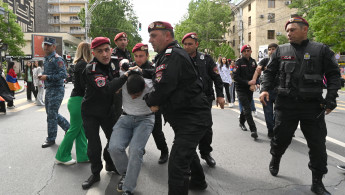Armenia detains 156 protesters opposed to Azerbaijan land deal
Armenia on Monday briefly detained scores of demonstrators trying to block streets in the capital Yerevan as part of protests against government plans to concede land to the country's historic foe, Azerbaijan.
The ex-Soviet Caucasus country has agreed to hand over territory it has controlled since the 1990s and has started border delimitation efforts, in a bid to secure an elusive peace deal with Baku and avoid another bloody conflict.
The territorial concessions have sparked weeks of protests by demonstrators, who have blocked major roads in an attempt to force Prime Minister Nikol Pashinyan to change course.
Protest leader Archbishop Bagrat Galstanyan had urged opponents of the deal to crowd the streets of Yerevan on Monday in a fresh show of opposition to the deal.
The 52-year-old joint Armenian and Canadian citizen is a church leader of the Tavush region, which Armenian forces captured in the 1990s and where Pashinyan had agreed to cede control of four villages.
The interior ministry said that a total of 156 people had been detained on Monday but that protesters had failed to close off any streets in Yerevan and that all those detained were later released.
AFP journalists in the capital had seen hundreds of people join the demonstration on Monday and saw police carrying out detentions on the streets.
Armenia and Azerbaijan, two former Soviet republics in the south Caucasus, have been locked in a stand-off over disputed territory, primarily Nagorno-Karabakh, since the break-up of the Soviet Union.
The two countries last month announced they had begun border demarcation work as part of normalisation efforts between the arch-foes.
The Armenian and Azerbaijani foreign ministers met over the weekend in Kazakhstan as part of ongoing efforts that at various stages have been mediated by the European Union, Russia and the United States.




 Follow the Middle East's top stories in English at The New Arab on Google News
Follow the Middle East's top stories in English at The New Arab on Google News

![A group of Palestinians, foreign and Israeli activists gather to participated in an olive picking event on the land in the town of Battir, which is under threat of confiscation by Israel in Bethlehem, occupied West Bank on 8 November 2024. [Getty]](/sites/default/files/styles/image_330x185/public/2182930803.jpeg?h=199d8c1f&itok=__0LgGsa)
